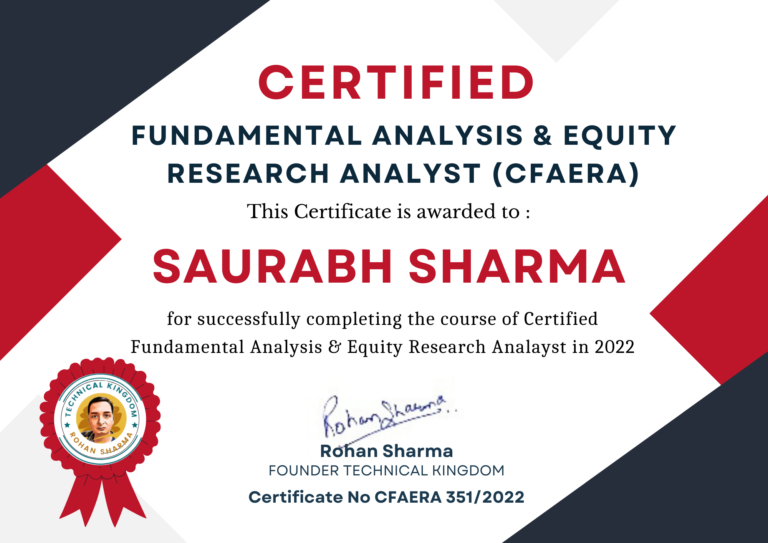- +91 9261 2110 03
- ptaimp@gmail.com
- Mon - Sat: 8:00 - 20:00
Best Fundamental Analysis Course in Jaipur is the art of evaluating the Hidden Value of a Equity Stock to find long-term investing opportunities. Learn stock analysis in the Fundamental Analysis & Equity Research Module . In fundamental analysis & Equity Research Training Institute in Jaipur you analyze a security by using economic, financial, qualitative and quantitative factors to determine its Intrinsic value . To Learn Stock Markets & Investment Analysis this Course is best suitable to your needs. To learn equity Research & fundamental analysis Module we provide live internship & training to get exposure & confidence in your analysis.

Concepts of Fundamental Analysis

Portfolio Management Strategies

Concepts of Economic Analysis

Stock Selection
Process

Concept of Company Analysis

Financial Statement Analysis

Concept of Ratio Analysis

Concepts of Valuation Methods

Financial Forecasting Models

Live Case Study of Stocks

Fundamental Filteration of Stocks

Concept of Research Reports

Rohan Sharma’s accomplishments in the financial markets over his 11-year career cover retail stock broking, high-end training, and investment management for corporations, making him an authority in his field.
He believes in the intensity of discipline and control required to create a successful risk management taking environment that prompts consistent and acceptable long-term execution. We focus on generating higher risk-adjusted returns for our clients by combining comprehensive operational transparency with cutting-edge trading infrastructure of the highest worldwide standards.
We are driven to establish a new standard of institutional excellence and to provide our investors with the most efficient and profitable environment possible.



The candidate is prepared to become a SEBI-registered research analyst, allowing them to deliver research and trading techniques to their clients. Candidate's advice is also represented in the public domain, such as on a website or a financial news programme.
Relationship managers are critical to the organization's revenue creation. He is in charge of the front end operations and manages consumers on a one-on-one basis. A proactive and effective relationship manager builds a company's brand and reputation while also assisting it in achieving its objectives.
Brokers now offer a comprehensive financial planning service that covers investing, insurance, retirement planning, and tax preparation. They provide specialized services and solutions to their consumers on a daily basis to meet their financial demands.
After gaining the essential competence, knowledge of markets and tools, and execution of trading techniques in real-time markets, back testing is required. Candidate may also provide personalized portfolio management services or work with organizations that provide portfolio management services.
My Students make me feel proud . People always say one person can’t make difference ,but I have proof that these kids have made a difference.






We are keep close working with industry needs & customized our program

To prepare students for careers in the business world, we provide paid internships as well as industry certifications from professional groups.

We maintain constant contact with industry professionals and several recruiters in order to provide the finest opportunity for Fundamental Analysis students.

Industry Expert Faculty
Faculty in Fundamental Analysis & Equity Research Courses are needed to deliver industry insights and current trends, as well as apply tools and indicators in real-time markets.
Choose the perfect plan
Fundamental analysis is a way of knowing the internal workings of a firm at the most essential, i.e. fundamental financial level. This is accomplished by examining numerous fundamental indicators and factors. A fundamental analysis of a firm can assist you grasp the fundamental assumption on which the business is built.
Fundamental analysis is a technique for determining a stock’s objective value. External events and effects, as well as financial statements and industry trends, are all included in this type of study. Remember that a stock’s intrinsic/fair value does not alter on a daily basis. To determine what that fair value is, look to fundamentals, which are what drive price movements up and down.
Fundamental analysis evaluates a company’s fundamental ratios to determine its financial health. So, at the end of the process, you should have a good idea of what the stock price of the company should be. This indicates if your purchase price was greater or less. As a general rule, when you acquire a stock at its fair value or less, you stand to benefit because the market price is always more than the fair value.
When you go to acquire a stock, such as TCS, you are aware that the current market price is Rs 1230 per share. This is merely the market price; someone must be asking for this amount to sell TCS shares.
As a long-term investor, your aim is to acquire the stock at a far lower price than its true worth. So, if TCS’s genuine value is Rs 1400, purchasing it for Rs 1230 makes sense. If the real worth of TCS stock is Rs 1100, purchasing it for Rs 1230 is not a good deal for you.
Fundamental research and numerous stock fundamental reports inform investors about the actual or fair worth of a stock. As a result, you know if you’re making a fair bargain for the buyer or the seller. If the current market price is less than the fair value, also known as intrinsic value, the company or stock is considered to be undervalued.
When the current market price exceeds the fair value, the company/stock is considered to be overvalued. In short, this is the significance of fundamental stock analysis.
Every competent stock brokerage has a research department. Analysts on the research desk do fundamental analysis on the equities they cover. These are among the advantages of fundamental analysis, which are covered in depth in a company’s or stock’s fundamental report.
These reports are typically 5-10 pages in length. They describe the company’s financial performance, as well as provide statistics on the company’s past profit and loss and balance sheet. There is also a value assessment supplied so that investors may understand how much they are paying for the stock based on its prospects. Each basic report also includes certain charts and illustrations.
Fundamental analysis investigates all elements that may have an influence on a company’s stock price in the future, such as financial statements, management processes, industry, and so on. It examines the firm’s intrinsic worth to determine if the stock is under-priced or overpriced.
Technical analysis, on the other hand, forecasts the price movements of an entity in the future by using prior charts, patterns, and trends.
Fundamental analysis is divided into three sections: Economic Analysis, Industry Analysis and Company Analysis.
Fundamental analysis is a very complete method that necessitates a thorough understanding of accounting, finance, and economics. Fundamental analysis, for example, necessitates the ability to analyses financial accounts, an awareness of macroeconomic dynamics, and knowledge of valuation procedures. It largely forecasts future growth using publicly available data, such as a company’s previous earnings and profit margins.
Fundamental analysis can be performed either top-down or bottom-up Approach.
An investor who uses the top-down technique begins his or her study by considering the general health of the economy. An investor attempts to establish the general performance of the economy and selects the industries and sectors of the economy presenting the best investment possibilities by examining numerous macroeconomic parameters such as interest rates, inflation, and GDP levels.
The bottom-up technique is another option. Instead of beginning on a bigger scale, the bottom-up strategy begins with an examination of individual stocks. The bottom-up approach’s logic is that individual stocks may outperform the industry as a whole. The bottom-up method focuses mostly on microeconomics indicators such as a company’s earnings and financial measures. Analysts that take this method do a comprehensive evaluation of each organisation in order to obtain a better grasp of its operations.
Some Fundamental Analysis Parameters that must be considered.These are the key elements that influence stock analysis, and they are as follows:
These are the six main variables that are considered while doing a fundamental examination of any asset.
EPS, P/E ratio, P/B ratio, Debt/Equity ratio, and RoE ratio are some quantitative fundamental analysis aspects. These are some of the few basic indications that might assist you learn more about the company/stock.



** Some Sample Images of Certificates, Those Students will get after Successfully Completion of the NISM & NSE Examination
Be prepare to Become a Certified Fundamental Analysis & Equity Research Analyst (CFAERA). The Fundamental Analyst course was created after a thorough examination of market behavior and volatility. Students will learn Stock Valuation techniques, Basic Concepts of Fundamental Analysis, Portfolio Management, Economic Analysis, Stock Selection Process, Company Analysis, Financial Statement Analysis, Ratio Analysis and Good Equity Investments, as well as a variety of strategies for understanding market behavior and psychology of a typical investor/trader, as well as how stock markets react to this, using charts.
More to Know !!
Ask Queries to Your Mentor
As a matter of fact you can watch live market trading that helps you to connect with CMT. Join a Technical Analysis Course which works on real time markets by using tools & techniques . That’ll give you behavioural understanding of real time Share market. Understanding the money management by real time trading or investment activity. As we know CMT is an MCQ Exam & ask question on application level. Create short notes of Course Content. Get PPT based Short Notes & note interpretation of tools & Techniques on technical analysis. Short Notes help you out to quick revision at the CMT exam time. CMT Books have very complicated language & course content is not properly aligned as it takes topics from various books of different writers.
So we have to take individual topics and understand concepts in simple, Concise and Clear manner. Take content from various books or websites like Investopedia or Stock Charts on Each Topic for in-depth understanding. Apply tools & techniques with the help of Technical analysis or trading software’s. Read Books twice as MCQ can be created from a single line. while study mark important topics.